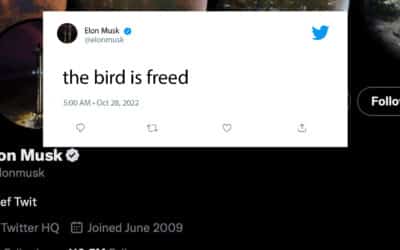Elon Musk’s recent $44bn takeover of Twitter has certainly raised a few eyebrows, and has been much discussed in the press and across social media ever since it was first suggested that the world’s richest person may get involved in the platform that has long struggled to realise its commercial potential, writes Robert Jewitt, Senior Lecturer in Media and Cultural Studies at the University of Sunderland.
While the likes of YouTube and Instagram have clear and successful revenue strategies, Twitter has fallen way behind its social media rivals, and it begs the question what a change of ownership might do to the platform renowned for its ‘robust’ and frequently febrile discussions.
Indeed, it could be argued that Twitter has been more successful at generating attention than it has been at remunerating its stakeholders. Yet taking a public company private does mean a potential loosening of some of the constraints normally imposed by a board of directors, forever answerable to their shareholders. There’s been some recent hints that Musk has some ideas for new revenue generation, such as charging a monthly fee for a verified blue tick status, while also rumours of drastic staffing cuts that could see between 25% and 75% of staff being let go.
The desire to transform the ‘de facto public town square’ by the self-styled ‘free speech absolutist’ was partly a reaction to Twitter’s moderation policies that Musk sees as favouring liberal voices online at the expense of a certain former President or a rapper espousing antisemitism. There are some fears that this takeover may lead to an uptick in toxic hate speech on the platform, yet the changing regulatory frameworks of the UK and the EU do mean that the site has to conform to different cultural and regional expectations. Twitter is no longer a young upstart, free to do as it pleases. The world has moved on since its initial inception on 2006.
While much has been made of Musk’s $27bn role in the purchase, he doesn’t go into this deal alone. A smaller but significant investment has been contributed by Qatar Holding who are answerable to the Qatar Investment Authority (aka Qatar’s sovereign wealth fund), while the Saudi Arabian Prince, Alwaleed bin Talal, has traded his shares for a say in the company’s management. $13bn worth of loans from various banks and investment firms means that idea that Musk will have free hand to do as he pleases is somewhat misleading.
Pressure to deliver a return on these investments may mean that some of the more radical ambitions that have been associated with Musk (such as turning Twitter into a radical bastion of free speech, or the resurrection a Vine-like short form video function) may be somewhat tempered by corporate expectations.
The new self-declared ‘Chief Twit’ has already made some big decisions in firing three of the company’s top executives – chief executive Parag Agrawal, chief financial officer Ned Segal, and legal, policy and safety head Vijaya Gadde – who now leave with multimillion dollar severance packages. The need to find a way to cut the $400m gap between the firm’s expenses, loan interest and its revenues will mean the plan to charge the 300,000 verified users $8 per month will fall way short of what is needed to keep the lights on. Twitter has already experimented with a monthly subscription service in Twitter Blue, which unlocks premium features like the ability to ‘undo’ a Tweet for the sum of $4.99 a month. It’s currently unclear if Musk’s verified status fee would include access to Blue.
Regardless, generating advertisement revenue and licencing data seem to be falling short of what’s needed to ensure the firm’s viability so some visionary thinking may well be needed. It’s not clear precisely how much value can be added by making Twitter into a free speech playground.
Perhaps Musk’s fondness of China’s WeChat app holds the key to the firm’s future. The instant messaging app allows users to pay for goods and service alongside the inherent social network functionality, and this is something Musk admires. He has hinted at an ‘everything app’ rumoured to be called ‘X’ which would seem to point to one possible future but it faces stiff competition from the likes of Amazon and Apple who have already made mobile transactions relatively quick and easy.
And yet WeChat has been criticised for the way in which it enabled the mass surveillance of its users, some of which found themselves subject to state intervention and internment in ‘re-education’ centres. While the plight of Uyghurs in China may seem far removed from the current Twitter take-over by the world’s richest person, users of the service can be forgiven for being sceptical as to the future intentions of its new owner. The platform is supposedly struggling to keep its most active users engaged and it faces some serious problems – the top 10% of the platform’s users generate 90% of the traffic and half the firm’s current revenue.
While Twitter may not yet be desperate, it hasn’t stopped Musk from asking if the site was dying 6 month before he bought it. The current mood of the owner may be best described as ebullient but there are some very difficult decisions coming his way. Whether or not he can address them satisfactory may well provide the answer to his own question.
Robert Jewitt is Senior Lecturer in Media and Cultural Studies at the University of Sunderland.











